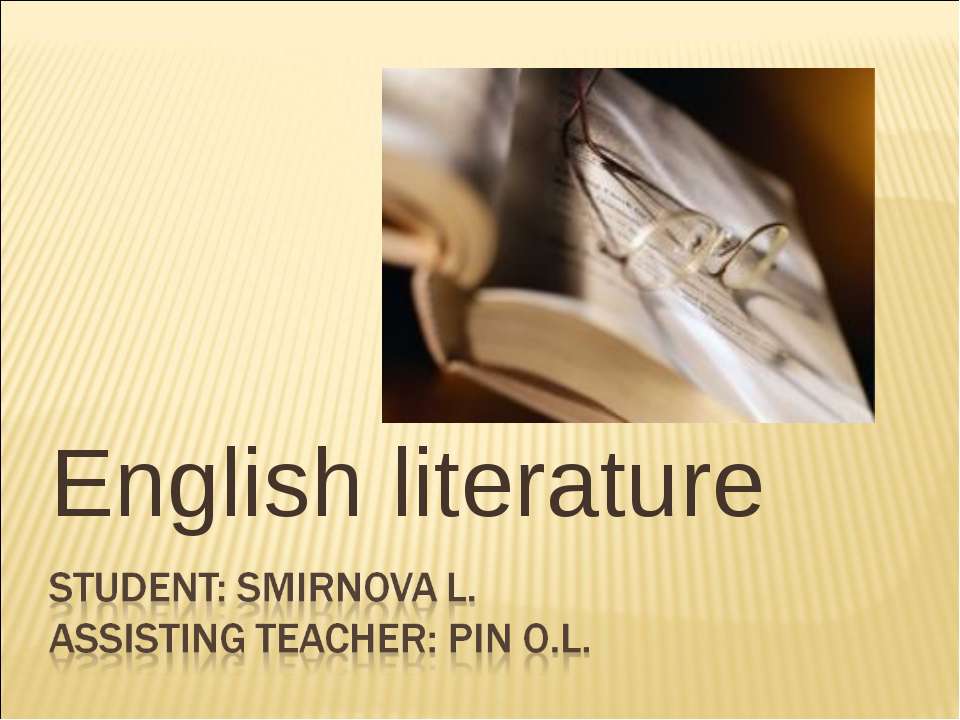Презентация - "English literature"

- Презентации / Презентации по английскому языку
- 0
- 14.10.20
Просмотреть и скачать презентацию на тему "English literature"
Сайт klass-uchebnik.com предлагает качественные учебные материалы для школьников, родителей и учителей. Здесь можно бесплатно читать и скачивать современные учебники, рабочие тетради, а также наглядные презентации по всем предметам школьной программы. Материалы распределены по классам и темам, что делает поиск максимально удобным. Каждое пособие отличается логичной структурой, доступной подачей материала и соответствует действующим образовательным стандартам. Благодаря простому языку, наглядным схемам и практическим заданиям, обучение становится легче и эффективнее. Учебники подойдут как для ежедневной подготовки к урокам, так и для систематического повторения перед экзаменами.
Особое внимание стоит уделить разделу с презентациями - они становятся отличным визуальным дополнением к теории, помогают лучше понять сложные темы и удерживают внимание учащихся. Такие материалы удобно использовать в классе на интерактивной доске или при самостоятельной подготовке дома. Все размещённые на платформе материалы проверены на актуальность и соответствие учебной программе. Это делает сайт надёжным помощником в образовательном процессе для всех участников: школьников, учителей и родителей. Особенно удобно, что всё доступно онлайн без регистрации и в свободном доступе.
Если вы ищете надежный источник для подготовки к урокам, контрольным и экзаменам - klass-uchebnik.com станет отличным выбором. Здесь вы найдёте всё необходимое, включая "English literature", чтобы сделать обучение более организованным, интересным и результативным.
So, the aim of my research is to get general knowledge of the history of the English literature from the end of the VIIth century to the middle of the XXth century as well as to study the issue of influence of the English literature over the Russian one in different historical periods.
get to know about different periods of the English literature get acquainted with the most representative writers of each period to observe specific tendencies in the English literature within each period to observe the influence of the English literature over the Russian one in each historical period In order to reach this aim, I had to accomplish the following objectives:
The first major monuments of Anglo-Saxon literature - Latin monuments - belong to representatives of the clergy. The most remarkable monument of ancient English poetry is the poem of Beowulf.
The author of the famous "Canterbury Tales". He made common cause with his famous contemporary, John Wycliffe (1320-1384).
Lily [1554-1606] Robert Greene [1560-1592] Christopher Marlowe [1563-1593] Ben Johnson [1574-1637] Webster [1575-1624]
love ( "Romeo and Juliet") jealousy (Othello "," Winter's Tale "), ambition ( "Macbeth") vindictiveness and greed ( "The Merchant of Venice") tyranny, ingratitude remorse ( "King Lear") melancholy - thirst for justice ( "Hamlet")
Walter Scott [1771-1831] His novels portray the most dramatic moments of the Scottish and English national history.
Thackeray [1811-1863] is more sarcastic and harsh in his criticism of the aristocratic-bourgeois society.
Disraeli [1805-1881] later known as famous Lord Beaconsfield. He considers the person to be a key to success.
Greene, Graham Murdoch, Iris Golding, William N McEwan, Ian Barnes, Julian Burgess, Melvin Naipaul, Vidiadhar Suradzhprasad N Harold Pinter N Doris Lessing N Dystopia: Huxley, Aldous Orwell, George Detective: Christie, Agatha Science fiction: Arthur C. Clarke Douglas Adams Fantasy: John Tolkien







![Lily [1554-1606] Robert Greene [1560-1592] Christopher Marlowe [1563-1593] Ben Johnson [1574-1637] W Lily [1554-1606] Robert Greene [1560-1592] Christopher Marlowe [1563-1593] Ben Johnson [1574-1637] W](https://vvoqhuz9dcid9zx9.redirectto.cc/s11/3/9/3/7/0/8.jpg)

![Godwin [1756-1836] Robert Burns [1759-1796] Godwin [1756-1836] Robert Burns [1759-1796]](https://vvoqhuz9dcid9zx9.redirectto.cc/s11/3/9/3/7/0/10.jpg)

![Walter Scott [1771-1831] His novels portray the most dramatic moments of the Scottish and English na Walter Scott [1771-1831] His novels portray the most dramatic moments of the Scottish and English na](https://vvoqhuz9dcid9zx9.redirectto.cc/s11/3/9/3/7/0/12.jpg)
![Dickens [1812-1870] was one of the most famous realistic writers. Dickens [1812-1870] was one of the most famous realistic writers.](https://vvoqhuz9dcid9zx9.redirectto.cc/s11/3/9/3/7/0/13.jpg)
![Thackeray [1811-1863] is more sarcastic and harsh in his criticism of the aristocratic-bourgeois soc Thackeray [1811-1863] is more sarcastic and harsh in his criticism of the aristocratic-bourgeois soc](https://vvoqhuz9dcid9zx9.redirectto.cc/s11/3/9/3/7/0/14.jpg)
![Disraeli [1805-1881] later known as famous Lord Beaconsfield. He considers the person to be a key to Disraeli [1805-1881] later known as famous Lord Beaconsfield. He considers the person to be a key to](https://vvoqhuz9dcid9zx9.redirectto.cc/s11/3/9/3/7/0/15.jpg)





